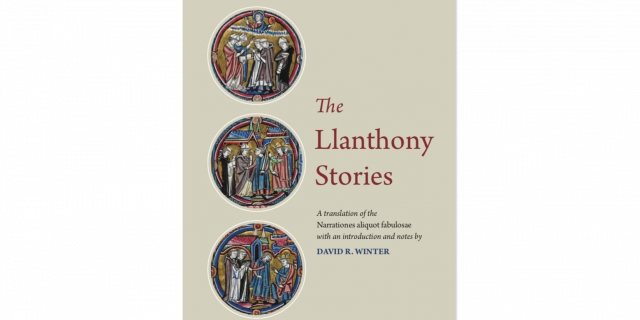
By
David Winter
October 2022
Print Version
What you need to know
As a scholar of medieval popular religion, I have recently published The Llanthony Stories: A translation of the Narrationes aliquot fabulosae with an Introduction and Notes (Toronto: Pontifical Institute of Mediaeval Studies Press, 2021). This is an edition, translation and study of a fragmentary collection of anonymous Latin preaching tales (i.e., “exempla”) from the early thirteenth century. The collection was originally gathered at the priory of Llanthony Secunda in Gloucester—one of the largest and most important houses of Augustinian canons in medieval Britain. The Llanthony Stories appears to be the earliest surviving collection of this type from the British Isles, and, until now, it has not been generally available to scholars or students.
Why this research is important
Throughout the later Middle Ages, scholastic theologians and preachers gathered illustrative stories—exempla—into vast, searchable catalogues for use in sermons, scholarship, and contemplation. The stories were often the most keenly anticipated part of a spoken or written text. This is because exempla were usually highly entertaining stories about popular subjects: well-known figures from the bible, Arthurian legends, the lives of the saints, or contemporary life. Many of the tales feature knights, demons, heroes and scoundrels. In the libraries of Europe, there are thousands of exemplary stories contained in hundreds of manuscripts from the period ca. 1180-1500. Some are very popular and have been told and retold countless times, while others appear in only one or two collections. The collections themselves became much more sophisticated over time, and eventually developed into early encyclopedias or “databases” of moral tales. Unfortunately, hundreds of exempla collections have languished in archives, unedited and uncatalogued. This is unfortunate as the stories they contain were generally intended for widespread consumption, and thus, exempla collections often reveal quite a bit about the worldview, values, and attitudes of Europeans during the medieval period.
How this research was conducted
The only surviving copy of the Llanthony text is a mid-thirteenth-century manuscript in the archival collection of Corpus Christi College, Oxford. Over many visits, I sat with the manuscript, examining the codex and the text for clues about its authorship and origin. Working both in situ and from photographs, I have edited and translated the medieval Latin text and written an extensive introduction. I have also included explanatory notes for each of the stories contained in the collection. These serve to identify historical figures named in the text, to explain obscure historical details, and to point readers to analogues and scholarship related to the stories.
What the researcher found
One of the reasons that earlier scholars were aware of The Llanthony Stories is that the collection contains a number of exempla about well-known public figures from medieval England and elsewhere—some of them uniquely preserved in this collection. For example, there are stories about Eleanor of Aquitaine, Thomas Becket, Philip Augustus, and Simon de Montfort. The author also told readers where he got his stories, often from famous churchmen and scholars: the Archbishop of Canterbury, Stephen Langton, the Welsh storyteller, Walter Map, and Gerard la Pucelle, among others. In addition to this, because the collection appeared so early, the author’s narrative strategies and page-based organisational devices are of particular interest to scholars.
How this research can be used
The Llanthony Stories is intended for use both by medieval scholars and students of the European Middle Ages. It will be of particular interest to scholars of pastoralia (i.e., the study of preaching and its auxiliaries), Anglo-Norman aristocratic culture, those interested in taxonomy and page-based heuristic strategies, as well as students of medieval Latin. By connecting each of the tales to a major online repository of exemplary materials, ThEMA (the Thesaurus Exemplorum Medii Aevi established by Jacques Le Goff and others in 2002), I have also helped to track dissemination patterns for medieval praedicabilia (i.e., “the preaching arts”).
About the Researcher
Keywords
- England
- exempla
- Latin
- medieval history
- preaching
Editor: Christiane Ramsey
Read more BU Research
Research at Brandon University follows comprehensive policies designed to safeguard ethics, to ensure academic integrity, to protect human and animal welfare and to prevent conflicts of interest.

